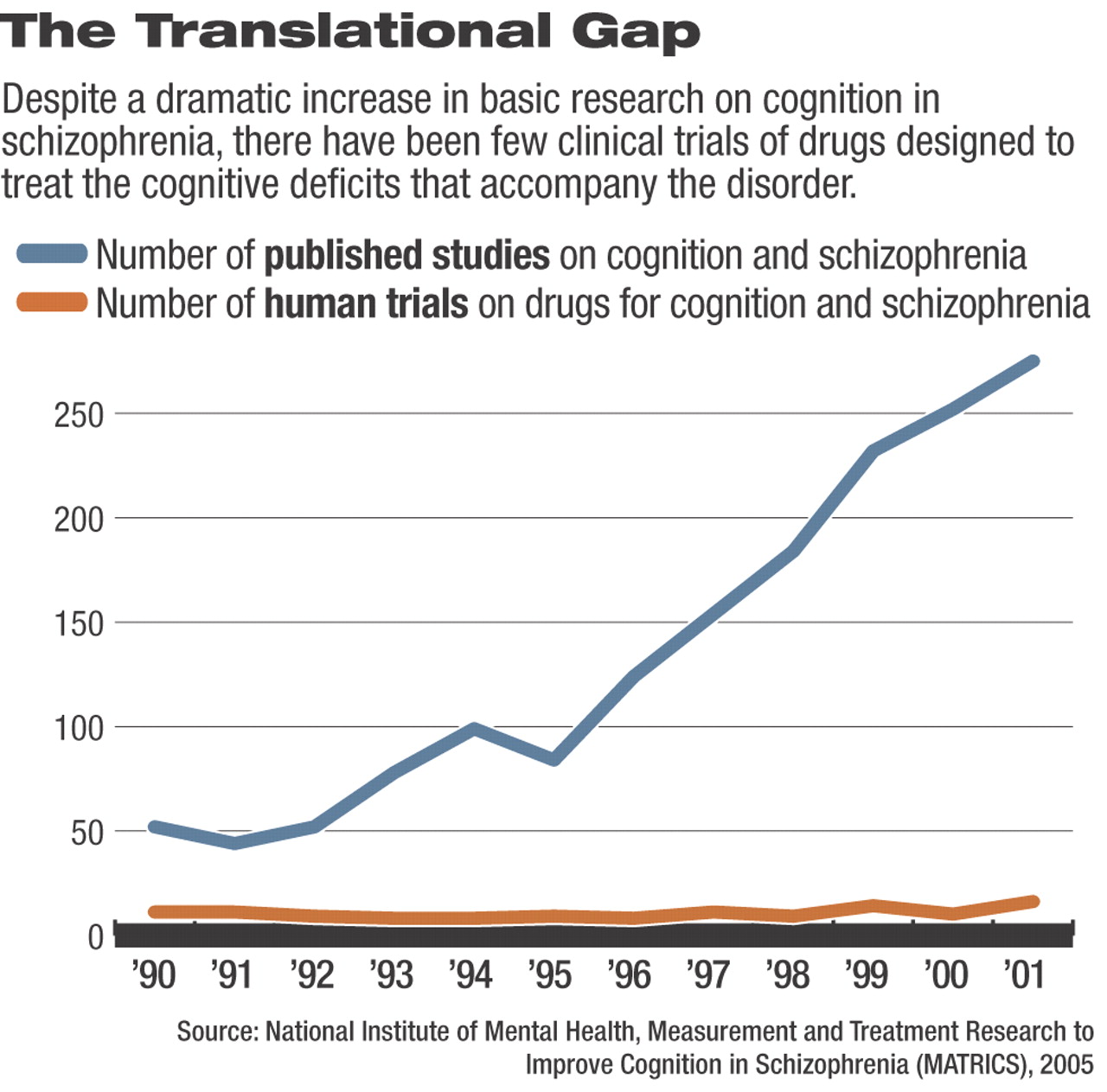Most coffee drinkers can testify to the effect of that first cup on the ability to focus and concentrate on the day's tasks. In an aging population, the ability to enhance cognition in the same way but with more lasting effects through pharmaceuticals—improving memory, sharpening attention, maximizing problem-solving skills—would seem to point in the direction of a colossal “exploitable market” for pharmaceutical companies.
For patients with schizophrenia, such a breakthrough would be a windfall of another sort: a substantial body of literature has shown it is the negative symptoms and cognitive impairments of the disorder that contribute most to poor functional outcome and diminished quality of life.
Yet more than a decade of basic research on the neurobiology of cognition in schizophrenia has resulted in few clinical trials of agents targeting cognitive impairments. Fifty years after the introduction of Thorazine and the continual refinement of drugs targeting hallucinations and other positive symptoms, the real functional recovery of patients—in terms of employment and independent living—remains for the great majority not significantly better than it was in 1954.
In the face of this, the National Institute of Mental Health (NIMH) has mounted a small-scale neurobiological “Manhattan Project,” bringing together industry, academic researchers, and regulatory authorities to foster development of drugs that target the cognitive impairments of schizophrenia.
Measurement and Treatment Research to Improve Cognition in Schizophrenia (MATRICS) is designed to close what psychiatrist Wayne Fenton, M.D., calls“ the translational gap” between the very large body of basic research on cognition in schizophrenia and the paucity of clinical studies on drugs targeting cognitive impairments (see
chart).
Fenton is director of adult translational research and treatment development at NIMH and program director for MATRICS. The MATRICS contract was awarded to the University of California at Los Angeles School of Medicine in September 2002, with Stephen Marder, M.D., a professor of psychiatry there, as principal investigator.
“For a decade and a half or so we have known that cognitive impairments represent a separate domain of disability that likely has a distinct neurobiology,” Fenton told Psychiatric News.“ During that time the number of articles published related to cognition in schizophrenia has gone up dramatically, but the number of human clinical trials of agents designed to improve cognition has barely moved at all.”
Almost three years after the launching of MATRICS, schizophrenia experts say the project has in recent months yielded tangible results that will measurably improve the chances a drug will come to market within the next decade.
One crucial achievement has been acceptance by the Food and Drug Administration (FDA) of consensus guidelines for the conduct of clinical trials. Those guidelines address issues such as choice of patients, appropriate cognitive “endpoints,” length of follow-up, and use of concomitant medications.
That's critical because it provides drug companies a validated protocol for conducting trials and a reasonable level of comfort about investing dollars in expensive clinical studies. Fenton explained that development of innovative compounds in this area has been stalled because different companies using separate criteria for determining effectiveness have been reluctant to move forward with expensive testing without regulatory assurance that their criteria are valid.
The companies “have been told that the FDA cannot accept an endpoint simply for the convenience of a company,” he said. “What was necessary was a broad scientific consensus that really articulated what the deficits are and how to measure them.”
William Carpenter, M.D., director of the Maryland Psychiatric Research Center, said the guidelines provide that consensus. “The MATRICS guidelines are a terrific accomplishment because industry can walk away saying, `Here is a trial design that is acceptable to the FDA.'”
Conversely, Carpenter said, it prevents the promotion of compounds based on idiosyncratic criteria—what he called “the myth-making about drugs that purportedly affect cognition without showing any real efficacy.”
Jim Hagan, Ph.D., vice president of biology for the Psychiatry Center of Excellence in Drug Discovery at GlaxoSmithKline (GSK), agreed that the MATRICS guidelines give the industry a regulatory structure in which it can proceed with experimentation.
Testing Framework Being Built
“When a company goes to regulatory authorities, the regulatory authority has to agree whether the data the company provides satisfy the claims it is making,” he told Psychiatric News. “Building that sort of regulatory testing framework will allow companies to progress with compounds for cognition.”
Along with clinical-trials guidelines, the MATRICS project also produced a consensus battery of neurocognitive tests and a rank ordering of the most promising molecular targets for treating cognitive impairments in seven domains of cognition: working memory, attention/vigilance, verbal learning and memory, visual learning and memory, speed of processing, reasoning and problem solving, and social cognition (see
chart on facing page).
Leaders say together these should help to jumpstart development of drugs targeting cognition. Hagan, of GSK, said his company is advancing internally its own trials of a 5HT6 serotonin receptor antagonist for treating dementia.
And last month the NIMH-sponsored Treatment Units for Research on Cognition in Schizophrenia (TURNS) program began accepting its second round of nominations for potential compounds. TURNS, a companion project to MATRICS, is a network of trial sites dedicated to researching agents to enhance cognition in schizophrenia.
Marder, who is also principal investigator for TURNS, said that candidate compounds have been nominated for virtually all of the molecular targets listed by MATRICS; clinical trials for two compounds are expected to begin this year.
Despite optimism generated by MATRICS, experts are cautious about forecasting the likelihood of a marketable drug. In the absence of a reliable bridge between evidence of effectiveness in animal models of cognition and efficacy in humans, drug companies are largely shooting in the dark.
“The fundamental issue is that we don't have a very clear understanding of what goes wrong in the pathophysiology of schizophrenia and why it causes cognitive impairment,” Hagan said. “That makes it difficult to model in any meaningful way. Companies like to see some evidence in preclinical species that their molecule has the desired effect and a reasonable chance to progress to therapy in humans.
“But there is significant variation in animal models of cognition,” he continued. “So there's a lot of ambiguity around what you should do with an experimental molecule if you don't have a fair degree of confidence that those models are predicting efficacy in humans.”
So, speeding the production of agents for cognition depends largely on reducing that scientific ambiguity, and thereby the financial risk involved in testing, so manufacturers can make rational decisions about whether to proceed with expensive trials of candidate molecules early in the experimental process.
But at the present stage of scientific understanding, experimentation with agents for cognition remains a gamble—especially when compared with the lucrative, 50-year tradition of developing new psychiatric drugs by tweaking already existing compounds.
As Fenton said, “If you were a drug company, and you knew that the last five SSRIs to reach the market could generate a billion dollars in sales, why would you take the risk of investing in some hare-brained molecule for treating cognition?”
Carpenter suggested that one promising possibility to help manufacturers make informed decisions about their candidate molecules is the discovery of“ phenotypic markers” of cognitive impairment. These might include abnormalities in smooth eye movement or “sensory gating”—the ability to manage and organize incoming environmental stimuli—which can be measured electrophysiologically and appear to be related to cognition and poor outcome.
“If the drug tended to reverse the abnormality, it might encourage you to a make a bigger investment in it,” he said.
Phenotypic signals of that type might also presage the discovery of real biologic markers of cognitive impairment, greatly increasing the chance that drug companies could invest in the right molecules early in the process—and discard those that are unlikely to be successful—and hastening an era of true, rational drug discovery.
Until then, Carpenter said, clinicians should know that targeting cognition marks a new way of thinking about schizophrenia and that their patients' disabilities may be distinct phenomena with a unique neurobiology.
“The paradigm is shifting away from thinking of a single entity with multiple components derived from the same latent process and toward thinking of a disease in which patients have multiple components that need to be looked at independently,” he said.
The guidelines, consensus battery, and ranking of candidate molecules are posted at<www.matrics.ucla.edu>.▪

